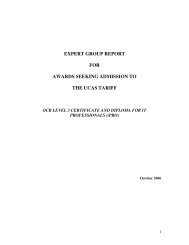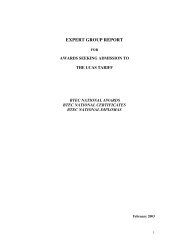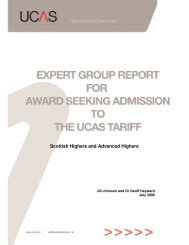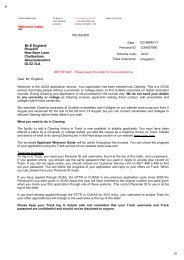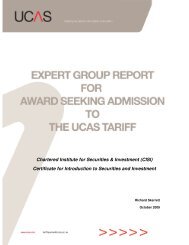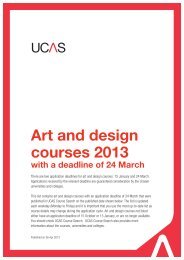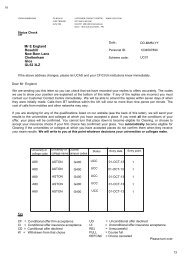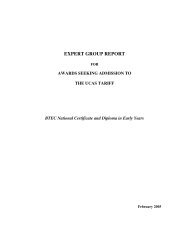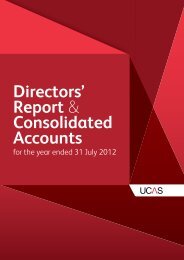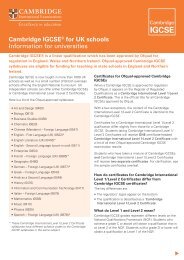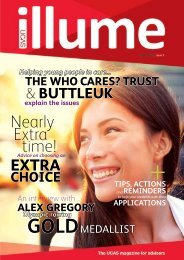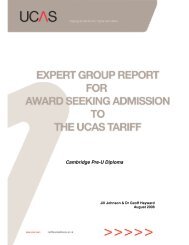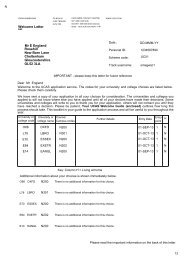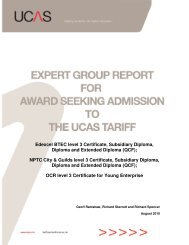International qualifications 2013 (pdf) - CUKAS
International qualifications 2013 (pdf) - CUKAS
International qualifications 2013 (pdf) - CUKAS
Create successful ePaper yourself
Turn your PDF publications into a flip-book with our unique Google optimized e-Paper software.
Appendix C – <strong>International</strong> Baccalaureate Middle Years Programme<br />
(MYP), Diploma Programme (DP) and Certificates and the IB Career<br />
Related Certificate (IBCC)<br />
MIDDLE YEARS PROGRAMME (MYP)<br />
The Middle Years Programme (MYP) offered by the <strong>International</strong><br />
Baccalaureate (IB) provides a framework of academic and life<br />
skills for students aged 11–16. The five-year programme follows<br />
on from the IB’s Primary Years Programme and serves as a<br />
preparation for the IB’s Diploma Programme.<br />
The MYP provides a framework of concepts, skills, objectives and<br />
assessment criteria in eight subject groups and a pedagogy<br />
aimed at engaging students in disciplinary understanding by<br />
exposure to authentic connections as well as developing their<br />
awareness of the relationships between disciplines.<br />
The MYP is guided by the following three fundamental concepts,<br />
rooted in the IB mission statement: communication, intercultural<br />
awareness and holistic learning.<br />
The “areas of interaction” are at the core of the programme,<br />
providing the contexts for curriculum planning and an opportunity<br />
for teachers’ and students’ interaction with authentic situations.<br />
Students develop an understanding of each through contribution<br />
in all subjects. They are grouped as: approaches to learning,<br />
community and service, health and social education,<br />
environments and human ingenuity. These pervade and recur<br />
throughout the five years of the MYP, through the eight subject<br />
groups, and also through interdisciplinary teaching and projects,<br />
whole-school activities and the MYP personal project. The areas<br />
of interaction are not directly assessed nor awarded individual<br />
grades, since they are perspectives rather than subjects.<br />
In the last year of the MYP, students complete the personal<br />
project, a significant body of work, the product of the student’s<br />
own initiative and creativity. The personal project must reflect a<br />
personal understanding of the areas of interaction and the<br />
application of skills acquired through approaches to learning.<br />
MYP students are expected to choose their project, which can<br />
take many forms, and take the process to completion with the<br />
supervision of an adult in the school. The personal project forms<br />
part of the assessment scheme of the MYP. It involves planning,<br />
research and a high degree of personal reflection.<br />
All schools are expected to develop their own written curriculum<br />
following the guidelines provided by the IB and ensuring students<br />
will be able to meet the objectives for the final year of the<br />
programme. In doing so, schools may need to consider any<br />
national or local requirements about mandated curricula, provided<br />
the integrity of the MYP is respected at all times.<br />
The MYP subject groups:<br />
g<br />
g<br />
g<br />
g<br />
g<br />
g<br />
Arts – visual arts and performing arts<br />
Humanities – studies of individuals, societies and environment<br />
including subjects such as history, geography, economics,<br />
politics, civics, sociology, anthropology and/or psychology<br />
Language A – student’s best language, usually the school’s<br />
language of instruction<br />
Language B – a modern foreign language learned at school<br />
Mathematics – course includes the five branches of<br />
mathematics: number, algebra, geometry and trigonometry,<br />
probability and statistics, and discrete mathematics<br />
Physical Education – course includes health and fitness,<br />
individual and team sports<br />
g<br />
g<br />
Sciences – biology, chemistry, physics<br />
Technology – computer and design technology.<br />
MYP authorisation and programme evaluation of schools: All<br />
schools undergo an authorisation visit, following a minimum of<br />
one year as a candidate school. Four years after authorisation<br />
and then every five years, the school receives a programme<br />
evaluation visit, which is the culmination of a detailed self-study<br />
process. The IB standards and practices provide the framework<br />
towards authorisation and programme evaluation.<br />
ASSESSMENT<br />
Teachers assess students’ work with guidance from IB according<br />
to prescribed, published criteria which state final levels of<br />
achievement in each discipline for the final year of the<br />
programme. All schools must assess their students with the<br />
published assessment criteria in the final year. The IB also<br />
provides recommended interim assessment criteria based on the<br />
objectives for each of the subject groups for years 1 and 3 of the<br />
five-year programme. Schools can opt for the MYP certificate,<br />
accompanied by a record of achievement issued by the IB. These<br />
are formal documents limited to schools that offer the last year of<br />
the programme and elect to have their own student assessment<br />
validated by IB through a rigorous and quality assured process of<br />
external moderation.<br />
The IB will issue an MYP certificate to each student who satisfies<br />
the following conditions. The student must:<br />
g<br />
g<br />
g<br />
g<br />
g<br />
be registered, and have gained at least a grade 2 in at<br />
least one subject per subject group of the MYP. (Please<br />
note that a second language A may be taken instead of a<br />
language B.)<br />
have gained at least a grade 3 for the personal project<br />
have participated in the programme for at least the final two<br />
years<br />
have met the expectations of community and service to<br />
the satisfaction of the school<br />
have gained a grade total of at least 36 from the eight<br />
subject groups and the personal project combined, out of a<br />
possible maximum of 63. (This total and the maximum will<br />
be different in the case of the mother-tongue language<br />
option or if a student has gained an exemption due to<br />
special educational needs.) If more than one subject has<br />
been entered in a given subject group, only the single best<br />
grade will count towards certification, although all subject<br />
results will appear on the MYP record of achievement.<br />
The IB also provides all schools with a portfolio of achievement<br />
for each student. This allows the school to document the<br />
student’s accomplishments at the end of the course. The portfolio<br />
includes papers from the IB describing the programme. The<br />
school may add its own certificates, academic results and<br />
awards, a self-evaluation by the student, information about<br />
community and service, the personal project and any other<br />
achievements. Schools not applying for MYP certificates are<br />
required to regularly submit samples for the process of<br />
monitoring of assessment to ensure they comply with the<br />
assessment requirements of the programme.<br />
78 INTERNATIONAL QUALIFICATIONS



